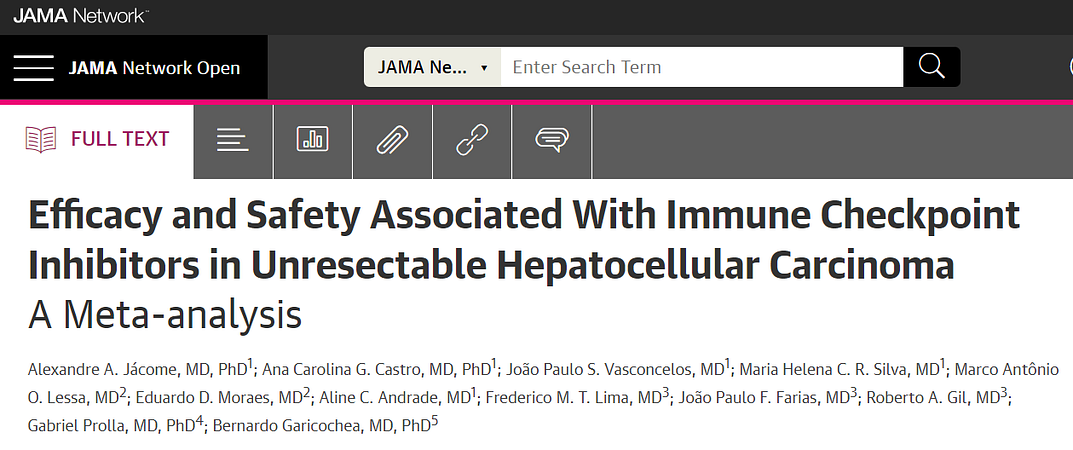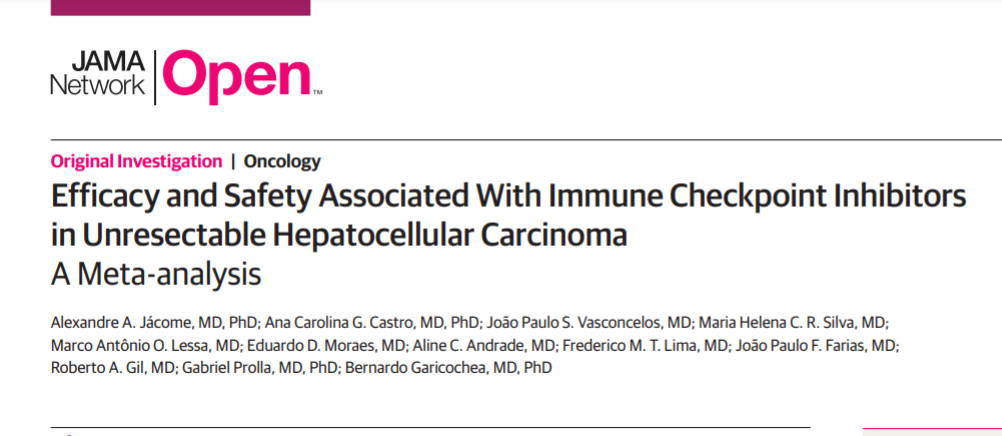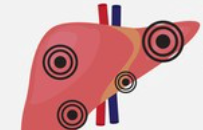Principalmente quando utilizada em combinação com outras medicações.
Esta é uma republicação do paper abaixo, precedida de uma visão geral sobre o mesmo, pelo autor líder do paper.
Efficacy and Safety Associated With Immune Checkpoint Inhibitors in Unresectable Hepatocellular Carcinoma — A Meta-analysis
JAMA Netw Open.
Alexandre A. Jácome, MD, PhD1; Ana Carolina G. Castro, MD, PhD1; João Paulo S. Vasconcelos, MD1; Maria Helena C. R. Silva, MD1; Marco Antônio O. Lessa, MD2; Eduardo D. Moraes, MD2; Aline C. Andrade, MD1; Frederico M. T. Lima, MD3; João Paulo F. Farias, MD3; Roberto A. Gil, MD3; Gabriel Prolla, MD, PhD4; Bernardo Garicochea, MD, PhD5
December 6, 2021
Overview
O número de casos novos de câncer de fígado, chamado de hepatocarcinoma ou carcinoma hepatocelular (CHC), vem apresentando aumento no Brasil nos últimos anos. O passo seguinte da cirrose hepática, independente da causa, pode ser o CHC.
As hepatites B e C, e o uso excessivo do álcool, são clássicas causas de cirrose hepática e CHC, mas temos observado exponencial aumento de câncer secundário a esteatose hepática, condição em que há depósito de gordura no fígado, frequentemente negligenciada pela população.
O transplante hepático ou a ressecção cirúrgica da lesão são os tratamentos de escolha do CHC, mas na impossibilidade destes tratamentos, a imunoterapia tem se apresentado como uma recente opção terapêutica.
Os estudos iniciais mostraram resultados conflitantes, o que demandou a realização da primeira revisão sistemática e meta-análise sobre este assunto na literatura médica, liderada pelo nosso Grupo de Oncologia Gastrointestinal na Oncoclínicas e publicada no prestigioso jornal científico JAMA Network Open.
Por este estudo, demonstramos que a imunoterapia apresenta maior eficácia e segurança que o tratamento farmacológico padrão em casos de CHC avançado, principalmente quando utilizada em combinação com outras medicações.
Para ter acesso ao estudo na íntegra, basta clicar abaixo. Fique a vontade para compartilhar!
Originally published on the linkedin of Dr. Alexandre Jácome

Key Points
Question
What are the efficacy and safety associated with immune checkpoint inhibitors (ICIs) vs standard therapies in unresectable hepatocellular carcinoma (HCC)?
Findings
In a meta-analysis of 3 randomized clinical trials totaling 1657 patients, ICIs were associated with significantly improved overall survival, progression-free survival, and overall response rate compared with standard therapies. In addition, the rate of grade 3 or 4 treatment-related adverse events was lower with ICIs than with sorafenib.
Meaning
These findings suggest that ICIs should be the new standard of care in systemic therapy of unresectable HCC.
Abstract
Importance
Immune checkpoint inhibitors (ICIs) have yielded conflicting results in hepatocellular carcinoma (HCC). The overall effect of ICIs compared with standard therapies in unresectable HCC requires more research.
Objective
To estimate the efficacy and safety associated with ICIs compared with standard therapies in patients with unresectable HCC.
Data Sources
PubMed, Cochrane Library, Web of Science, Latin American and Caribbean Health Sciences Literature, and American Society of Clinical Oncology and European Society of Medical Oncology meeting proceedings were systematically searched. Reference lists from studies selected by electronic searching were manually searched to identify additional relevant studies. The search included literature published or presented from February 2010 to February 2020.
Study Selection
From December 2019 to February 2020, independent reviewers evaluated each database, scanning the title, abstract, and keywords of every record retrieved. Full articles were further assessed if the information given suggested that the study was a randomized clinical trial (RCT) comparing ICIs vs standard therapies in the treatment of unresectable HCC.
Data Extraction and Synthesis
The full text of the resulting studies and extracted data were reviewed independently according to PRISMA guidelines. Summary hazard ratios (HRs) of overall survival (OS) and progression-free survival (PFS) were calculated by a random-effects model. The likelihood of ICIs being associated with overall response rate (ORR) and treatment-related adverse events (TRAEs) was expressed by odds ratios (ORs) using a random-effects model.
Main Outcomes and Measures
The main outcomes were OS, PFS, ORR, and TRAEs.
Results
Of 1836 studies yielded by the search, 3 were retained, totaling 1657 patients (985 treated with ICIs vs 672 receiving standard treatment). Two studies evaluated ICIs as monotherapy, and 1 study investigated the combination of ICIs with bevacizumab. Compared with standard therapies (sorafenib in first-line therapy or placebo in second-line therapy), ICIs were associated with significantly improved OS (HR, 0.75; 95% CI, 0.62–0.92; P = .006), PFS (HR, 0.74; 95% CI, 0.56–0.97; P = .03), and ORR (OR, 2.82; 95% CI 2.02–3.93; P < .001). The probability of grade 3 or 4 TRAEs was lower with ICIs than with sorafenib (OR, 0.44; 95% CI, 0.20–0.96; P = .04).
Conclusions and Relevance
This meta-analysis found superior efficacy and safety associated with ICIs compared with standard therapies and highlights the survival benefit associated with the combination of antiangiogenic therapy with ICIs in first-line systemic therapy of unresectable HCC.
LONG VERSION OF THE ORIGINAL PUBLICATION (excerpted)

Introduction
Hepatocellular carcinoma (HCC) is one of the most lethal malignant neoplasms, ranking as the fourth most common cause of cancer-related death in the world.1 Approximately 20% of patients have advanced disease at presentation, which portends a poor prognosis, with an estimated 5-year overall survival (OS) rate of 2%.2
The cornerstone of the treatment of unresectable or metastatic HCC is systemic therapy. Since 2008, sorafenib has been the standard of care, based on the pivotal phase 3 SHARP trial, which demonstrated an improvement in the median OS vs placebo (10.7 months vs 7.9 months; hazard ratio [HR], 0.69, 95% CI, 0.55 to 0.87; P < .001).3 In the past few years, other antiangiogenic agents, either tyrosine-kinase inhibitors or monoclonal antibodies, have been found to be effective for both patients who are treatment-naive (lenvatinib,4 donafenib5) and those who are resistant to sorafenib-based treatment (cabozantinib,6 regorafenib,7 apatinib,8 and ramucirumab9). Nevertheless, none has shown superiority over sorafenib.
Immune checkpoint inhibitors (ICIs) have ushered in a new era in cancer therapy, but their efficacy in HCC is uncertain. Single-arm phase 2 studies with patients who are resistant to sorafenib suggested clinical activity of nivolumab,10 pembrolizumab,11 and the combination of ipilimumab plus nivolumab,12 all of which have been approved by the US Food and Drug Administration. When evaluated as monotherapy in randomized clinical trials (RCTs), anti–programmed cell death protein 1 (PD-1) and anti–programmed cell death 1 ligand 1 (PD-L1) inhibitors did not demonstrate superiority compared with standard care. Nivolumab and sorafenib yielded similar OS rates in previously untreated patients (16.4 months vs 14.7 months; HR, 0.85; 95% CI, 0.72 to 1.02; P = .08),13 and pembrolizumab did not meet the co–primary end point of OS in a placebo-controlled trial (13.9 months vs 10.6 months for placebo; HR, 0.78; 95% CI, 0.61 to 0.99; P = .02).14
The combination of atezolizumab, an anti–PD-L1 inhibitor, with bevacizumab was compared with sorafenib as first-line treatment of unresectable HCC in the phase 3 IMbrave150 trial.15 The combination was superior to sorafenib in OS and progression-free survival (PFS), the co–primary end points (12-month OS, 67.2% vs 54.6%; HR, 0.58; 95% CI, 0.42–0.79; P < .001; median PFS, 6.8 months vs 4.3 months; HR, 0.59; 95% CI, 0.47–0.76; P < .001).15,16 Based on the IMbrave150 findings, the combination of atezolizumab plus bevacizumab has replaced sorafenib as the standard of care for unresectable HCC.
Owing to the conflicting results of the studies with immunotherapy in HCC, we performed, to our knowledge, the first meta-analysis of RCTs addressing the overall outcomes associated with ICIs compared with the standard of care in unresectable HCC.
Methods
See the original publication
Results
See the original publication
Discussion
In this meta-analysis of 3 RCTs evaluating 1657 patients with unresectable HCC, in both the first-line and second-line setting, ICIs were shown to be associated with significantly better ORR, PFS, and OS, which had an overall reduction of 25% in the relative risk of death, compared with standard care (sorafenib or placebo). In addition, ICIs had a safer toxicity profile, with lower rates of grade 3 or 4 TRAEs.
The main driver of the overall benefit associated with ICIs found in this meta-analysis was the data obtained from the IMbrave150 study, which evaluated the combination of anti–PD-L1 plus anti–vascular endothelial growth factor (VEGF) therapy.15,16 ICIs as monotherapy have demonstrated limited efficacy in the systemic treatment of HCC. Since OS may be influenced by subsequent therapies and crossover, PFS might be a more unbiased end point to analyze the efficacy of ICIs. In CheckMate-459, PFS was similar between nivolumab and sorafenib (3.7 months vs 3.8 months),13 and in KEYNOTE-240, pembrolizumab yielded an improvement in PFS compared with placebo (3.0 months vs 2.8 months; HR, 0.71; 95% CI, 0.57–0.90; P = .0022).14 The phase 1b trial GO30140 by Lee et al21 randomly assigned previously untreated patients with unresectable HCC to atezolizumab plus bevacizumab or atezolizumab alone. In concordance with CheckMate-45913 and KEYNOTE-240,14 the GO30140 trial demonstrated shorter PFS with atezolizumab monotherapy than with the dual therapy (3.4 months vs 5.6 months; HR, 0.55; 80% CI 0.40–0.74; P = .01), with a median follow-up of 6.6 months. On the other hand, both IMbrave150 (HR, 0.59)15 and GO30140 (HR, 0.55)21 confirmed a clear superiority in PFS of the combination of anti–PD-L1 plus anti-VEGF compared with either anti–PD-L1 monotherapy or anti-VEGF alone.
Our data corroborate the findings of a recently published network meta-analysis that compared the efficacy of ICIs, VEGF inhibitors, and their combination among phase 3 clinical trials in patients with advanced HCC.22 It found that dual therapy with atezolizumab plus bevacizumab was associated with better outcomes than monotherapy with either nivolumab (HR, 0.68; 95% CI, 0.48–0.98) or VEGF inhibitors, such as lenvatinib (HR, 0.63; 95% CI, 0.44–0.89) and sorafenib (HR, 0.58; 95% CI, 0.42–0.80).22 That meta-analysis and ours support the conclusion that PFS and OS are similar between ICIs and VEGF inhibitors as first-line monotherapy. In a further analysis, our study found that ICIs were associated with improved ORR (OR, 2.82) and reduced toxic effects, corresponding to a reduction of 56% in the risk of grade 3 or 4 TRAEs compared with sorafenib.
Nevertheless, most patients with HCC do not have an objective response to ICIs, even in combination therapies.15,23 HCC is a markedly heterogenous disease, frequently representing end-stage liver disease secondary to quite distinct underlying causes. It is not clear which patients are more sensitive to immunotherapeutic approaches. CheckMate-459 presented efficacy data by PD-L1 expression and suggested that patients with expression at 1% or greater had a higher likelihood to present ORR to nivolumab: 28% vs 9% with sorafenib in patients with PD-L1 expression, compared with 12% vs 7% in patients without PD-L1 expression.13 Patients with HCC associated with viral hepatitis also were more sensitive to ICIs. Chronic inflammation induces the expression of immune checkpoint molecules and promotes effector T-cell exhaustion,24 which might explain the supposed higher sensitivity of patients infected with hepatitis B or hepatitis C virus. Among 3 randomized clinical trials included in our study, IMbrave150 had the highest proportion of patients with viral hepatitis, representing 69% of the overall population,15 compared with 54% in CheckMate-45913 and 40% in KEYNOTE-240.14 However, correlating the higher degree of benefit of the dual therapy to the higher proportion of patients with viral hepatitis would be speculative.
Limitations
Our meta-analysis has some limitations. The strict inclusion criteria of our systematic review allowed for the selection of only 3 studies. Despite being an RCT addressing the role of ICIs, the GO30140 trial21 did not meet the criteria for being included in our meta-analysis because the comparator group (atezolizumab as monotherapy in the first-line setting) is not standard care. There is no minimum number of studies to be analyzed in a meta-analysis. However, meta-analyses with few studies or with small sample sizes compromise the precision of the tests that measure heterogeneity, such as τ2, χ2, and I2.25 On the other hand, since ours is the first meta-analysis, to our knowledge, to analyze the efficacy and safety of ICIs compared with standard care in unresectable HCC, which is an innovative field, it is expected to find a low number of RCTs.
The diversity of the RCTs analyzed in our meta-analysis prompted us to choose the random-effects model, since we do not expect a fixed effect in clinical trials with different control (sorafenib or placebo) and experimental (ICIs alone or ICI plus bevacizumab) groups. The inclusion of the IMbrave150 was the main source of between-study heterogeneity, as can be seen through the analysis of the funnel plot (eFigure 1 in the Supplement), which helps us understand the superior efficacy associated with the combination therapy compared with ICIs alone.
Conclusions
In this meta-analysis, dual therapy was evaluated in patients who were treatment naive with liver function scale Child-Pugh A, ECOG performance status 0 to 1, and treated gastroesophageal varices. The efficacy of dual therapy in patients previously treated with VEGF inhibitors, like sorafenib or lenvatinib, is not known. Therefore, atezolizumab plus bevacizumab should be preferentially used in the first-line setting in eligible patients. The best choice after unsuccessful dual therapy is not clear. In the past few years, several options for systemic therapy have been incorporated in the clinical management of advanced HCC, raising questions about how to better sequence the drugs. Until RCTs evaluating systemic therapy after unsuccessful treatment with ICIs in combination become available, offering tyrosine kinase inhibitors is plausible. If patients are not eligible to receive bevacizumab as first-line therapy, the safety profile of ICIs as monotherapy favors immunotherapy compared with sorafenib. Several ongoing RCTs are addressing the role of combination therapies in the first-line and second-line settings, which offers promise for better outcomes in patients affected by such a severe disease.
References
See the original publication
About the authors & affiliations
Alexandre A. Jácome, MD, PhD1;
Ana Carolina G. Castro, MD, PhD1;
João Paulo S. Vasconcelos, MD1;
Maria Helena C. R. Silva, MD1;
Marco Antônio O. Lessa, MD2;
Eduardo D. Moraes, MD2;
Aline C. Andrade, MD1;
Frederico M. T. Lima, MD3;
João Paulo F. Farias, MD3;
Roberto A. Gil, MD3;
Gabriel Prolla, MD, PhD4;
Bernardo Garicochea, MD, PhD5
Author Affiliations Article Information
- 1Department of Gastrointestinal Medical Oncology, Oncoclínicas, Belo Horizonte, Brazil
- 2Oncoclínicas, Salvador, Brazil
- 3Oncoclínicas, Rio de Janeiro, Brazil
- 4Oncoclínicas, Porto Alegre, Brazil
- 5Oncoclínicas, São Paulo, Brazil
Originally published at https://jamanetwork.com








